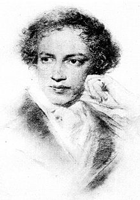To My Mother Poem by Roden Berkeley Wriothesley Noel
To My Mother
I am weeping, mother, in your empty chamber;
Beyond the pane, a fair familiar scene;
As a far dream only may the man remember
All the mirth of childhood that hath been -
Hath been here about thy young joy, O my mother,
All the mirth and laughter of a child!
Was it I, indeed, and not another,
Whom you folded in your dear arms undefiled?
Here you came to bless the dreaming boy;
All is melted to a memory uncertain,
Evening prayer, the game, and many a toy.
Clad in tender vivid verdure, early summer
Kindless leaf and bloom about the land,
While the nightingale, our passionate early comer,
Overflows in song for one at hand.
Winds the river in the valley by the meadow,
By the old grey bridge, anear the water-mill;
Old elms are on the green lawn with their shadow,
A bloom involves the orchard on the hill.
You were wont to give me orange-petal candied,
From the china bird, laid yonder near the clock . . .
Ah! visionary seasons, are ye banded
To weave illusion round me and to mock?
In the chestnut grove our nest, where in the leaf-time
We children took our strawberries and tea,
Hath fallen; dove, and cuckoo here renew their brief time,
Pale primrose, and the windflower, wood-anemone.
While I recall delightful days of childhood
In the home of our forefathers, when from school
I came to wander with you in the wild wood,
And my happiness ran over, very full.
How I lingered on the hard road in the damp night,
When you left me at my school, until aloof
I beheld no more your lessening line of lamplight,
Nor heard the minished trample of the hoof!
Among German forest-firs you tell the story,
As we go, her hand who died, and mine in yours.
Ah! the bonfire on the hillside, and the glory
Of our rural meal among the bilberry bowers!
Then a cottage o'er a torrent-haunted valley
In the summer-sounding vines was our abode,
Where Morn and Eve upon the mount continually
Wrought a robe of glory, as for God.*
Yearly, later, on an evening of the winter weather,
With our youngest born who died we came to you:
On arrival, what a welcome, at the meal we ate together,
You gave to weans, and wife, and me, so tender and so true! . . . .
All our converse in my manhood! by the healthful ocean-margin,
Or where we loved to hail the holy morning-glow,
Beyond blue water, on the mountain men have named the Virgin,**
On the glory of her heavenward height of pure and solemn snow.
In the isle where cloudy, melancholy Blaaven,
Of noble mould, empurpled, rules the heaving sea,
You, enfeebled, I supported from the haven,
To where Coruisk glooms crag-immured in lone sublimity. . . .
And the churchyard lieth beautiful to-day, love,
As in yonder dearer, earlier time,
When we wandered hand in hand with you in May, love,
We children, you in all your lovely prime!
Every green grave is a garden gently tended,
And birds sing in the orchard near the dead,
Meet repose for one whose day serenely ended,
Very weary, when the saintly spirit fled!
Joy was yours, and yet your life knew much of anguish,
Disenchantment, weariness, and pain;
In the later years of weakness, when I saw you languish,
I felt our aching void would be your gain.
Love unfailing, kindly counsel, all the pleasure
In your mere delightful presence, and your smile!
It is a loss that none may map or measure;
Life will feel it every weary mile!
O you, who were so kind and so forgiving,
If I grieved you, how my heavy heart hath bled!
Ah! and though unloyal hours may wrong the living,
We never think unkindly of the dead!
Friend in need, O consolation of the mourner,
Faithful heart, who suffered unremoved!
You leaned upon the Faithful, not a scorner;
You loved well; yea, and you were well-beloved.
A little lamb is playing in the orchard,
Faery gleams are fleeting on the hill;
There is a breadth of lilac in the churchyard,
And the dead are lying very still.
All the vernal loveliness a shadow
Of lovelier havens wherein you abide,
Cooler woodland water, warmer meadow,
In the love of Him, who healed you when you died!
Faded letters, and our pilgrimage in dreaming
Raise the dead, more dear than living men,
For, however we believe it only seeming,
Night brings them warm and real to our arms again!
It may be, mother mine, when you departed,
White and silent, that you did not wholly go,
Never left your children broken-hearted,
Help them more, are nearer than they know.
And your remembered tones are more than music,
More than day the memory of your smile;
Clear from all the cadences of sorrow,
May I hear them, and behold them in a little while!
Our eldest, and our youngest, are they gone now?
For a moment I may linger by the grave;
It may be that my day is nearly done now;
Lord, I would have them yonder; heal, and save!
This poem has not been translated into any other language yet.
I would like to translate this poem